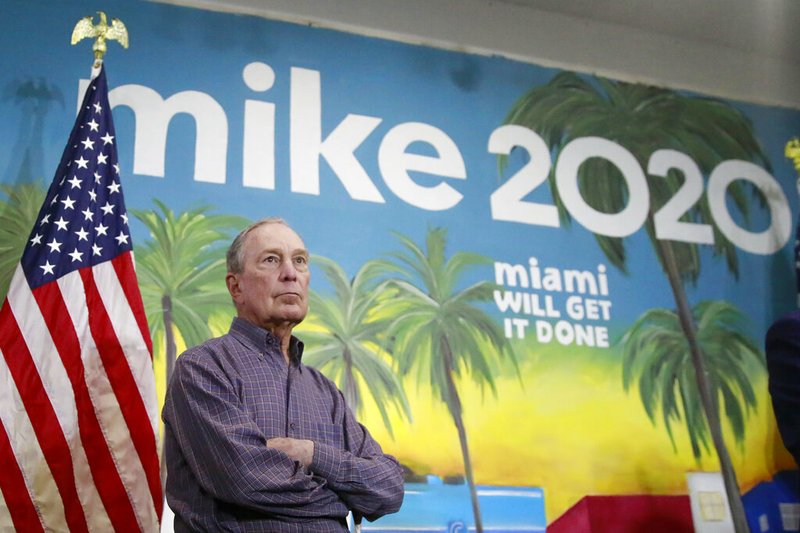NEW YORK — Over the course of 101 days Michael Bloomberg spent over $500 million of his own fortune in a quixotic bid for the presidency that collapsed in stunning fashion Tuesday night, when he won just one U.S. territory, American Samoa.
By Wednesday morning, he quit the race and endorsed former Vice President Joe Biden, saying his continued presence in the rapidly shrinking field would make it harder for the party to defeat Republican President Donald Trump in November, his ultimate priority. The billionaire businessman worth an estimated $61 billion pledged to keep spending to defeat Trump.
But that money wasn't enough to sell voters on the idea that a billionaire businessman and former New York City mayor with bottomless resources was the Democratic Party's best choice. While Bloomberg went from a non-existent campaign to a staff of 2,400 people across 43 states in less than three months, he won none of the 14 states that voted Tuesday night and picked up just a handful of delegates in states where he had cautiously hoped for victory as recently as last week.
That was before Biden's resurgence in South Carolina and the rapid realignment of Democrats behind him. Two of Bloomberg's former Democratic rivals, Amy Klobuchar and Pete Buttigieg, dropped out of the race and endorsed Biden as the moderate alternative to Vermont Sen. Bernie Sanders just the day before Super Tuesday.
Bloomberg said he has known Biden for a long time and knows Biden's commitment to issues including gun safety, health care, climate change and good jobs.
"I've had the chance to work with Joe on those issues over the years, and Joe has fought for working people his whole life," Bloomberg said. "Today I am glad to endorse him –- and I will work to make him the next President of the United States."
Bloomberg ran an unprecedented campaign from the start. His late entrance into the race in November prompted him to skip campaigning in the first four voting states of Iowa, New Hampshire, Nevada and South Carolina. He hung his success on Super Tuesday, spending at least $180 million on advertising in those states, but had planned to continue deep into the primary calendar, already spending millions on advertising in states like Florida, Michigan and Pennsylvania, where he had scheduled campaign events through the weekend.
Bloomberg, 78, is one of the world's richest men, worth an estimated $61 billion. His fortune flows from the financial data and media company that bears his name, which he started in the 1980s. In addition to serving 12 years as New York mayor, he endeared himself to progressive groups by pouring hundreds of millions of dollars into fighting climate change and curbing gun violence.
In the early weeks of his campaign, he used his vast fortune to introduce himself to voters outside New York on his own terms, and his rivals accused him of trying to buy the party's nomination and the White House. As voting drew closer, the former Republican was forced to confront his Democratic rivals head on by appearing alongside them on a debate stage.
He proved unable to overcome consistent criticism of New York's use of the stop-and-frisk police practice under his tenure as mayor, which disproportionately targeted young black and Latino men for searches aimed at finding weapons. The practice ended after a federal judge declared it unconstitutional, and Bloomberg apologized for using it weeks before announcing his presidential run.
He similarly faced pointed criticism — primarily from rival Elizabeth Warren — about the treatment of women at his company, Bloomberg LP. Under pressure from Warren, he said in mid-February he would release three women who sued him for harassment or discrimination complaints from confidentiality agreements. Women who worked for Bloomberg were featured in a commercial praising Bloomberg's and the company's treatment of women, and his longtime partner Diana Taylor defended him as a champion of women.
His vast fortune proved a foil for Sanders, who has said billionaires should not exist at all. Indeed, Bloomberg had a vast circle of influence from his spending on key causes like gun control as well as his philanthropic efforts to boost American cities and provide leadership training for mayors. Dozens of prominent mayors rallied behind his candidacy.
Trump, for his part, had paid close attention to the Democratic nominating contest and had been especially fixated on Bloomberg. Trump regularly railed against his fellow New Yorker on Twitter, mocking his short stature by calling him "Mini Mike" and claiming Bloomberg was the candidate he wanted to run against. On Tuesday, he called the results a "complete destruction" of Bloomberg's reputation.
What's next for Bloomberg's operation is unclear. He'd pledged to keep campaign offices open in key general election battleground states to help the Democrats defeat Trump even if he lost the party's nomination.
This story was originally published at 9:17 a.m.

